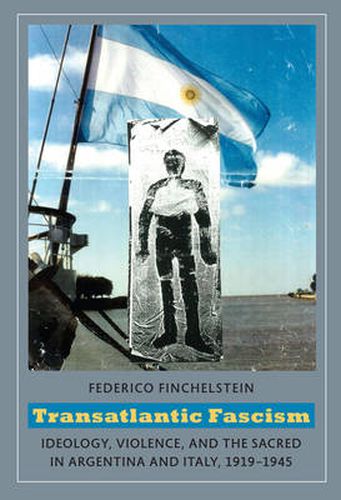Readings Newsletter
Become a Readings Member to make your shopping experience even easier.
Sign in or sign up for free!
You’re not far away from qualifying for FREE standard shipping within Australia
You’ve qualified for FREE standard shipping within Australia
The cart is loading…






In Transatlantic Fascism, Federico Finchelstein traces the intellectual and cultural connections between Argentine and Italian fascisms, showing how fascism circulates transnationally. From the early 1920s well into the Second World War, Mussolini tried to export Italian fascism to Argentina, the most Italian country outside of Italy. (Nearly half the country’s population was of Italian descent.) Drawing on extensive archival research on both sides of the Atlantic, Finchelstein examines Italy’s efforts to promote fascism in Argentina by distributing bribes, sending emissaries, and disseminating propaganda through film, radio, and print. He investigates how Argentina’s political culture was in turn transformed as Italian fascism was appropriated, reinterpreted, and resisted by the state and the mainstream press, as well as by the Left, the Right, and the radical Right.As Finchelstein explains, nacionalismo, the right-wing ideology that developed in Argentina, was not the wholesale imitation of Italian fascism that Mussolini wished it to be. Argentine nacionalistas conflated Catholicism and fascism, making the bold claim that their movement had a central place in God’s designs for their country. Finchelstein explores the fraught efforts of nationalistas to develop a sacred ideological doctrine and political program, and he scrutinizes their debates about Nazism, the Spanish Civil War, imperialism, anti-Semitism, and anticommunism. Transatlantic Fascism shows how right-wing groups constructed a distinctive Argentine fascism by appropriating some elements of the Italian model and rejecting others. It reveals the specifically local ways that a global ideology such as fascism crossed national borders.
$9.00 standard shipping within Australia
FREE standard shipping within Australia for orders over $100.00
Express & International shipping calculated at checkout
In Transatlantic Fascism, Federico Finchelstein traces the intellectual and cultural connections between Argentine and Italian fascisms, showing how fascism circulates transnationally. From the early 1920s well into the Second World War, Mussolini tried to export Italian fascism to Argentina, the most Italian country outside of Italy. (Nearly half the country’s population was of Italian descent.) Drawing on extensive archival research on both sides of the Atlantic, Finchelstein examines Italy’s efforts to promote fascism in Argentina by distributing bribes, sending emissaries, and disseminating propaganda through film, radio, and print. He investigates how Argentina’s political culture was in turn transformed as Italian fascism was appropriated, reinterpreted, and resisted by the state and the mainstream press, as well as by the Left, the Right, and the radical Right.As Finchelstein explains, nacionalismo, the right-wing ideology that developed in Argentina, was not the wholesale imitation of Italian fascism that Mussolini wished it to be. Argentine nacionalistas conflated Catholicism and fascism, making the bold claim that their movement had a central place in God’s designs for their country. Finchelstein explores the fraught efforts of nationalistas to develop a sacred ideological doctrine and political program, and he scrutinizes their debates about Nazism, the Spanish Civil War, imperialism, anti-Semitism, and anticommunism. Transatlantic Fascism shows how right-wing groups constructed a distinctive Argentine fascism by appropriating some elements of the Italian model and rejecting others. It reveals the specifically local ways that a global ideology such as fascism crossed national borders.